2013版初中英语全程复习方略课件(教材复习案)七年级上册 Units 1-4(冀教版)(共67张PPT)
文档属性
| 名称 | 2013版初中英语全程复习方略课件(教材复习案)七年级上册 Units 1-4(冀教版)(共67张PPT) | 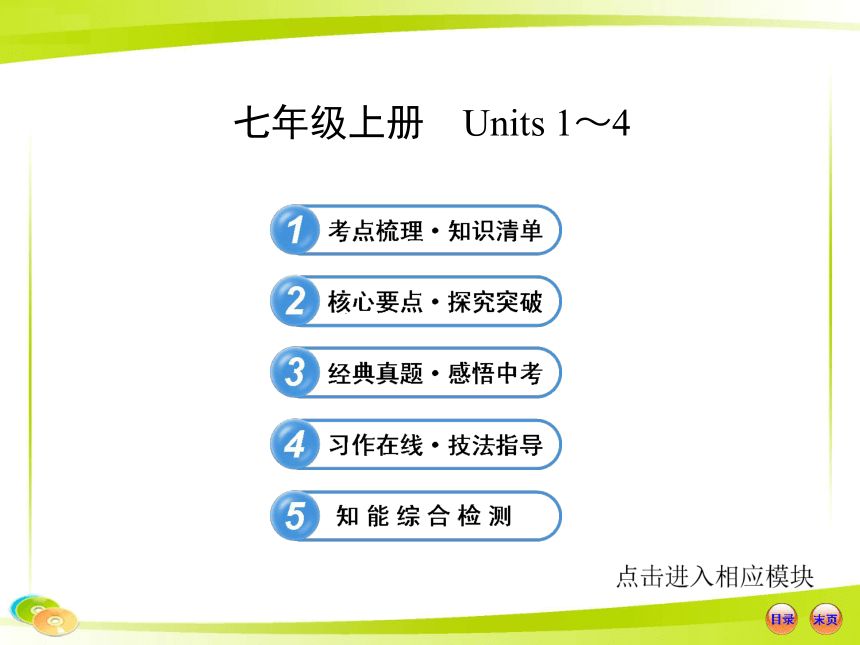 | |
| 格式 | zip | ||
| 文件大小 | 2.2MB | ||
| 资源类型 | 教案 | ||
| 版本资源 | 冀教版 | ||
| 科目 | 英语 | ||
| 更新时间 | 2014-03-01 23:02:47 | ||
图片预览

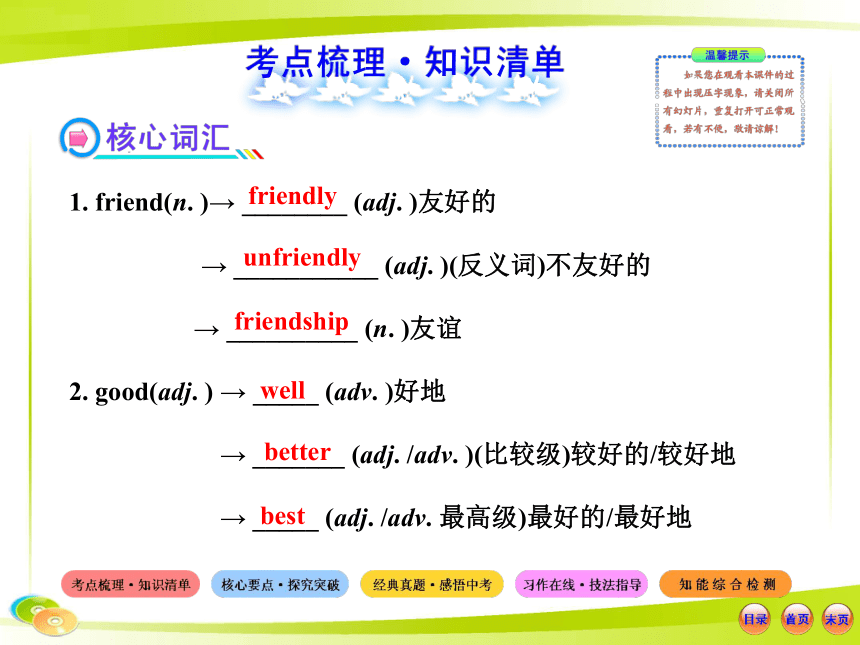
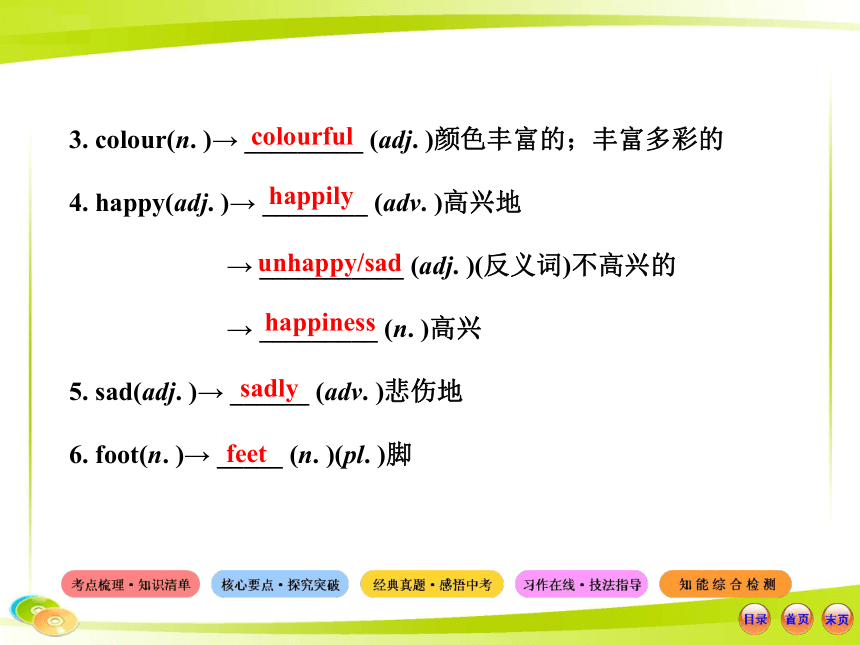
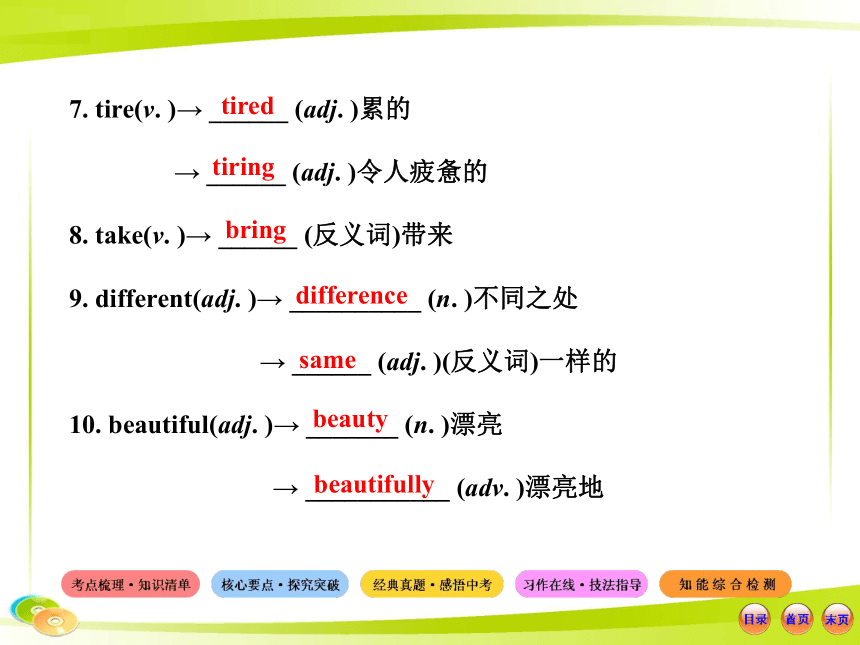
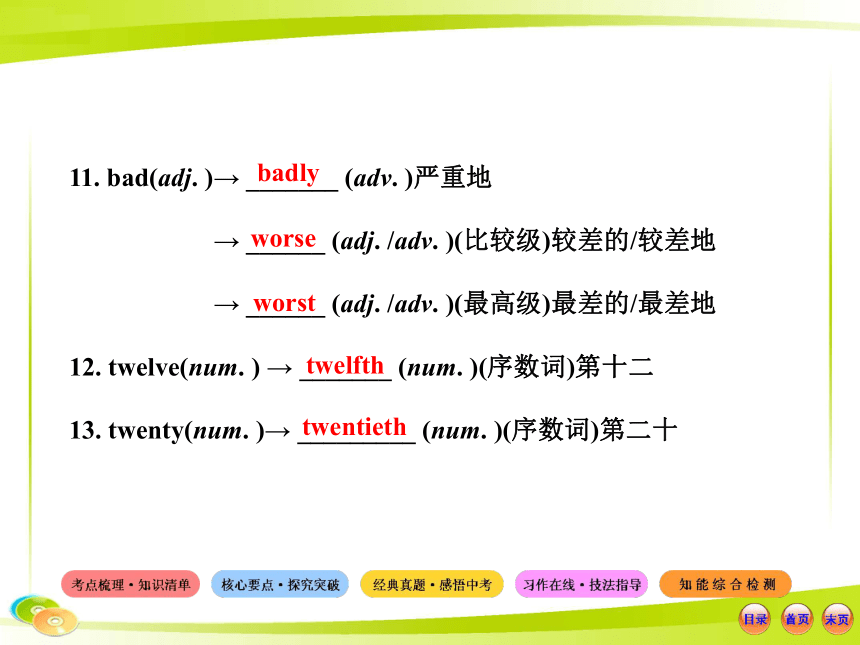
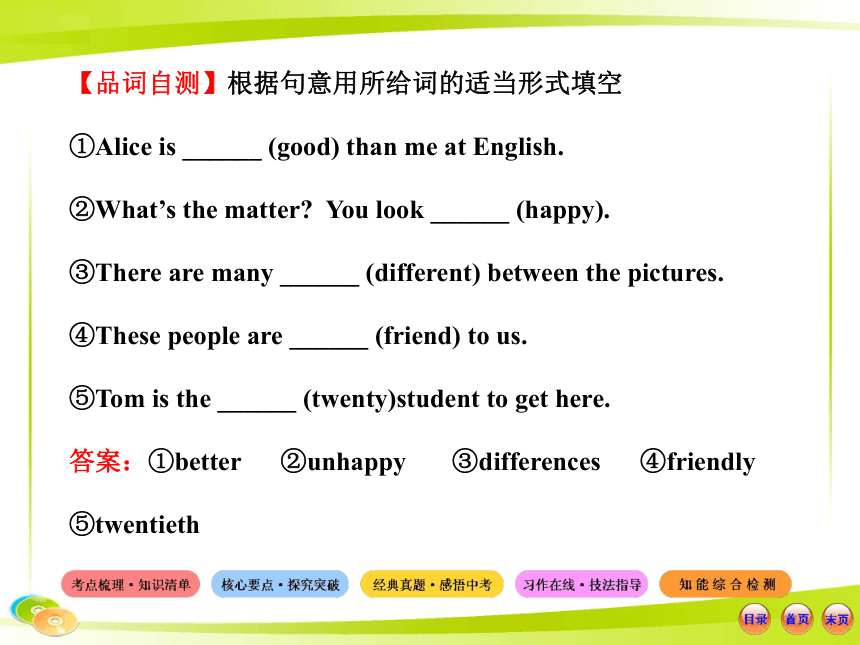
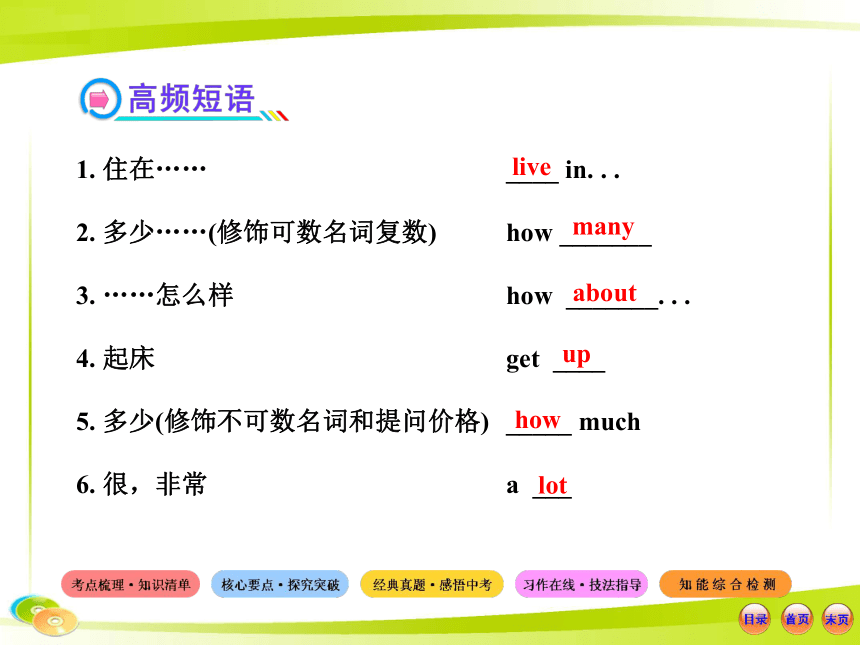
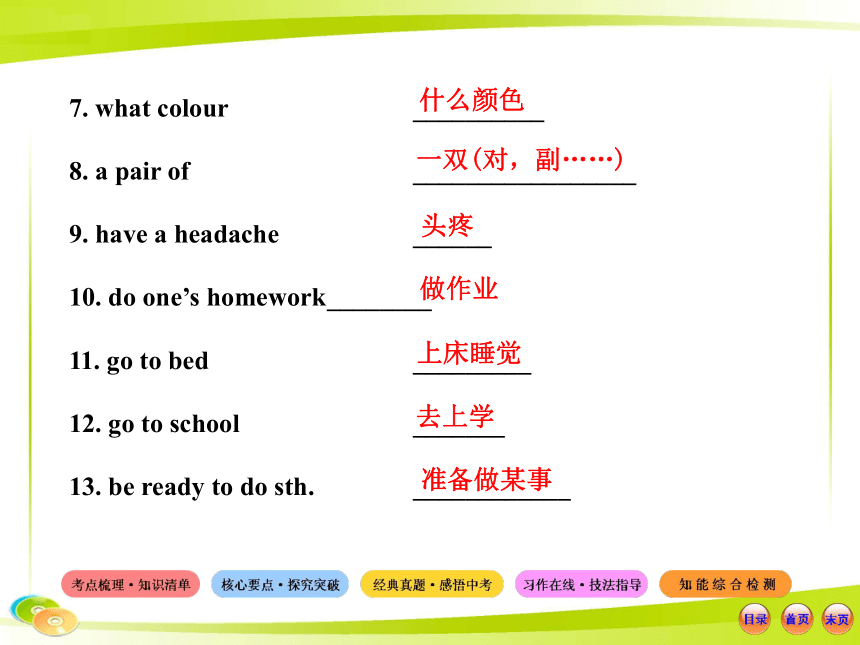
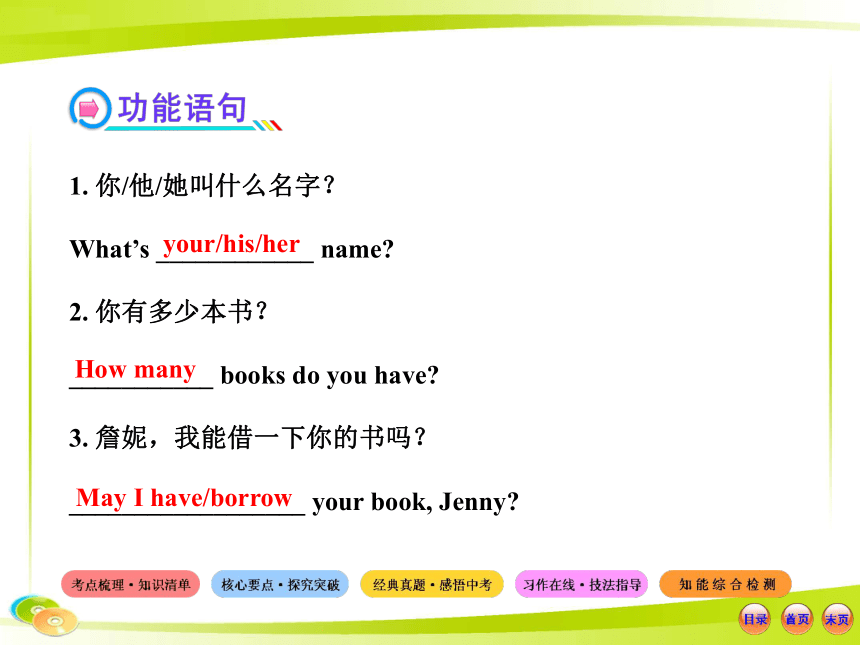
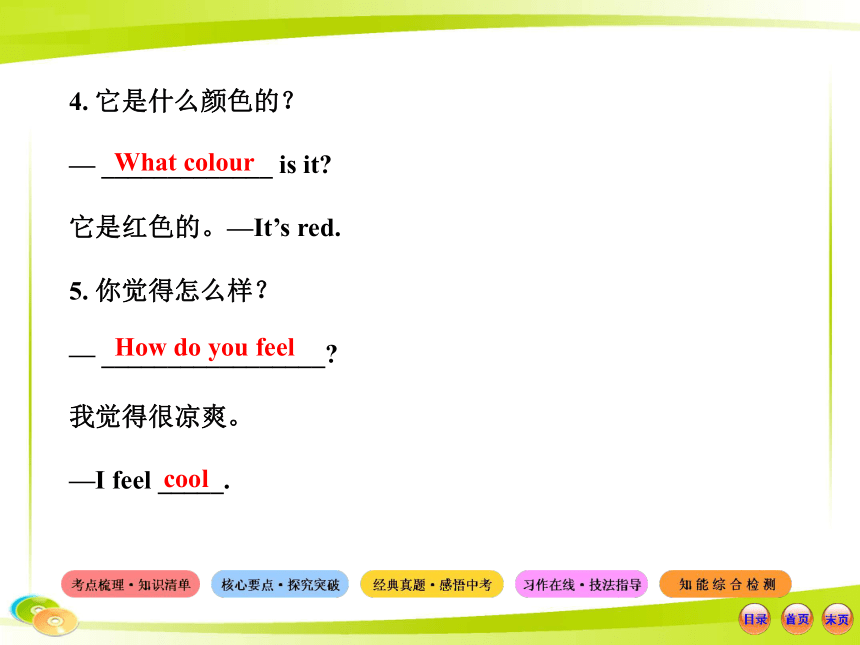
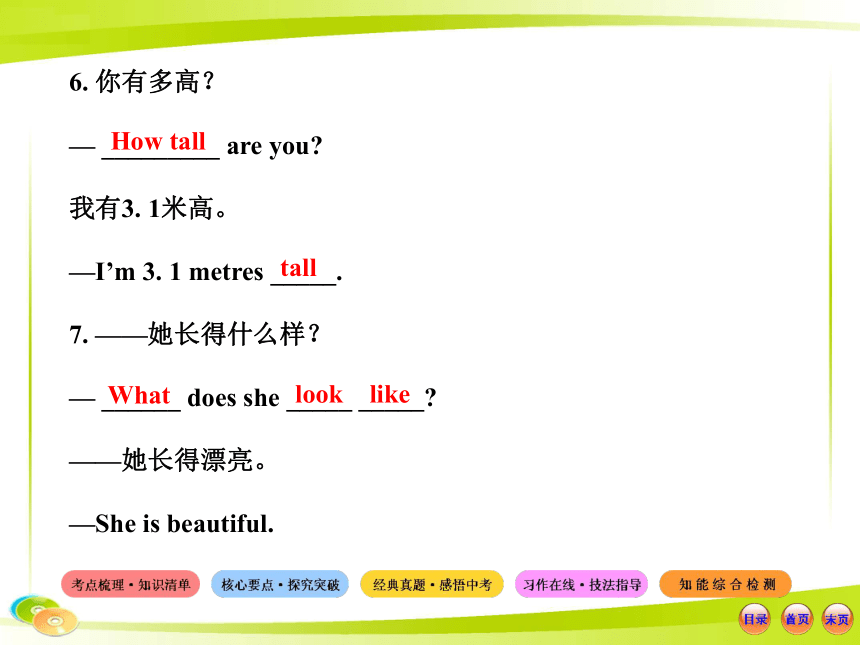
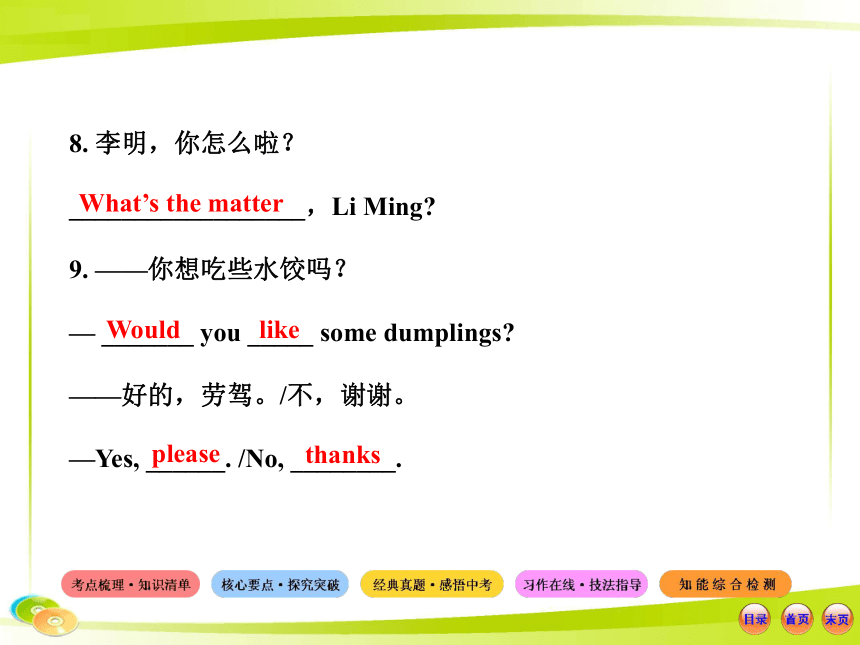
文档简介
课件67张PPT。七年级上册 Units 1~41. friend(n. )→ ________ (adj. )友好的
→ ___________ (adj. )(反义词)不友好的
→ __________ (n. )友谊
2. good(adj. ) → _____ (adv. )好地
→ _______ (adj. /adv. )(比较级)较好的/较好地
→ _____ (adj. /adv. 最高级)最好的/最好地friendlyunfriendlyfriendshipwellbetterbest3. colour(n. )→ _________ (adj. )颜色丰富的;丰富多彩的
4. happy(adj. )→ ________ (adv. )高兴地
→ ___________ (adj. )(反义词)不高兴的
→ _________ (n. )高兴
5. sad(adj. )→ ______ (adv. )悲伤地
6. foot(n. )→ _____ (n. )(pl. )脚colourfulhappilyunhappy/sadhappinesssadlyfeet7. tire(v. )→ ______ (adj. )累的
→ ______ (adj. )令人疲惫的
8. take(v. )→ ______ (反义词)带来
9. different(adj. )→ __________ (n. )不同之处
→ ______ (adj. )(反义词)一样的
10. beautiful(adj. )→ _______ (n. )漂亮
→ ___________ (adv. )漂亮地tiredtiringbringdifferencesamebeautybeautifully11. bad(adj. )→ _______ (adv. )严重地
→ ______ (adj. /adv. )(比较级)较差的/较差地
→ ______ (adj. /adv. )(最高级)最差的/最差地
12. twelve(num. ) → _______ (num. )(序数词)第十二
13. twenty(num. )→ _________ (num. )(序数词)第二十badlyworseworsttwelfthtwentieth【品词自测】根据句意用所给词的适当形式填空
①Alice is ______ (good) than me at English.
②What’s the matter? You look ______ (happy).
③There are many ______ (different) between the pictures.
④These people are ______ (friend) to us.
⑤Tom is the ______ (twenty)student to get here.
答案:①better ②unhappy ③differences ④friendly
⑤twentieth1. 住在…… ____ in. . .
2. 多少……(修饰可数名词复数) how _______
3. ……怎么样 how _______. . .
4. 起床 get ____
5. 多少(修饰不可数名词和提问价格) _____ much
6. 很,非常 a ___livemanyaboutuphowlot7. what colour __________
8. a pair of _________________
9. have a headache ______
10. do one’s homework ________
11. go to bed _________
12. go to school _______
13. be ready to do sth. ____________什么颜色一双(对,副……)头疼做作业上床睡觉去上学准备做某事1. 你/他/她叫什么名字?
What’s ____________ name?
2. 你有多少本书?
___________ books do you have?
3. 詹妮,我能借一下你的书吗?
__________________ your book, Jenny? your/his/herHow manyMay I have/borrow4. 它是什么颜色的?
— _____________ is it?
它是红色的。—It’s red.
5. 你觉得怎么样?
— _________________?
我觉得很凉爽。
—I feel _____. What colourHow do you feelcool6. 你有多高?
— _________ are you?
我有3. 1米高。
—I’m 3. 1 metres _____.
7. ——她长得什么样?
— ______ does she _____ _____?
——她长得漂亮。
—She is beautiful. How talltallWhatlook like8. 李明,你怎么啦?
__________________,Li Ming?
9. ——你想吃些水饺吗?
— _______ you _____ some dumplings?
——好的,劳驾。/不,谢谢。
—Yes, ______. /No, ________. What’s the matterWouldlikepleasethanks1. too adv. 也;又;太
◆I’m fine, too. 我也很好。
①Does your teacher ______ like playing soccer with you?
A. too B. also C. either D. as well
②Gina joined the music club, too. (改为否定句)
Gina ______ join the music club, ______. 【自主归纳】too/either/also/as well的用法辨析答案:①B ②didn’t; eithereitheralso2. tell v. 告诉;讲述
◆Tell me what’s your name.
告诉我你叫什么。
①—Do you _______ English or Chinese when you _______ with your English teacher?
—Usually English in class but Chinese after class.
A. speak; talk B. talk; say
C. tell; say D. speak; tell②He’s too excited to _______ anything.
A. speak B. say C. talk D. tell
③What are you talking _______?
A. to B. with C. for D. about
④My father often tells me _______ (not watch) TV too much. 【自主归纳】(1)
(2)
(3)
(4)A. 强调说话的能力或说某种语言
B. 指连续不断地讲话,强调交谈
C. 告诉;讲述,强调讲给别人听
D. 强调说话的内容【一言巧辨异】—What did the teacher tell you?
——老师告诉你什么了?
—He said that he would speak English when he talked with the visitors.
——他说他将用英语和游客们交流。
答案:①A ②B ③D ④not to watch3. look v. 看
◆Look up, look down and show us two.
向上看,向下看,向我们展示这两个动作。
①——你喜欢看电视还是看报纸?
—Do you like ______ TV or ______ newspapers?
——都不喜欢,我喜欢看电影。
—Neither. I like ______ films.
②The little boy like ______ his father.
A. looks B. sees C. watches D. looks at【自主归纳】watchlooklook at(1)watch指“(聚精会神地)看;注视”,如看电视、比赛等(2) _____ 强调“看”的动作,作不及物动词看黑板_______ the blackboard看电视 ______ TV答案:①watching;reading;seeing ②A(3) ____ 强调“看”的结果,如看电影、看病等看电影 ____ a film(4)read指“阅读”,如看书、报刊、杂志等看报纸 _____ the newspaperseeseeread4. wear v. 穿;戴
◆Who is wearing red?
谁穿着红色的衣服?
①Most children in our school _______ uniforms at school.
A. wear B. dress C. put on D. dress up
②我喜欢阅读时戴着眼镜。
I like _______ glasses when I read. ③(2011·广安中考)-David, can you _______ yourself?
-Of course, I can.
A. dress B. put on C. wear
④Mary is wearing a blue skirt now. (改为同义句)
Mary ______ ______ a blue skirt now. 【自主归纳】dress宾语通常是人,dress sb. “给……穿衣服”;
dress _______ “给自己穿衣服”;
be/get dressed in +衣服“穿着……”(状态)______宾语通常是衣服、鞋帽,强调动作,宾语若是代词必须放在两词之间;反义词组是take offdress/put on
强调动作oneselfput on答案:①A ②wearing ③A ④has on/is in_____宾语可为服装、鞋帽、饰物、奖章等,强调“穿着”的状态,可以用于进行时______宾语为衣服、帽子或颜色等,可以和wear或have. . . on替换wear/be in/ have. . . on/be dressed in
表示状态wearbe in5. feel v. 感到;觉得
◆I feel happy!
我觉得高兴!
①—Which T-shirt do you prefer?
—The red one. It _______ more comfortable.
A. tastes B. smells C. feels D. sounds
②The old man is ill and he doesn’t feel like _______.
A. to eat something B. to eat anything
C. eating something D. eating anything【自主归纳】feel的用法
答案:①C ②D doingeatinglikeWhat6. take v. 拿走, 带走
◆Take it out, please.
请把它拿出来。
①—Dick, _______ your raincoat with you when you go to school. It’s going to rain.
—OK. I will.
A. bring B. take C. get D. fetch
②爸爸下个月会带我去上海。
Father will ______ me ______ Shanghai next month. 【自主归纳】_____ (. . . to. . . )
拿去;带去把某物(人)从说话处带到别处,与bring方向相反______ (. . . to. . . )
拿来;带来把某物(人)从别处带到说话处carry搬运;提;拿不强调方向,但有负重之意get拿来;取来
(=fetch)去别处把某物(人)带来,强调动作的往返takebring答案:①B ②take; to7. would like想要
◆Would you like some dumplings, Jenny?
詹妮,你想要一些水饺吗?
①—Would you like something to drink?
— _______. I’m not thirsty.
A. Yes, please B. No, thanks
C. I’d love to D. No, I wouldn’t
②Would you like _______ (go) hiking with us next Sunday? 【自主归纳】 would like的用法及其构成的句型
(1)would like sb. to do sth. 意为“想让某人做某事”;
(2)Would you like. . . ? 意为“你想要……吗?”常用于表示客气地请求;其答语为:Yes, please. /No, thanks. ;
(3)Would you like to do sth. ? 表示提建议,答语常用I’d love/like to(拒绝时一般后接but I have to. . . ),也可用“Sorry, but I can’t. ”等类似句式。(4)would like与feel like的用法辨析
答案:①B ②to gowould like8. a lot很,非常;大量
◆Thanks a lot. 多谢。
①I like Chinese action movies _______.
A. a lot B. a lot of C. very D. much
②美国有很多著名的电影明星。
There are ______ ______ ______ famous movie stars in the USA. 【自主归纳】【一言巧辨异】 I think you like reading _____ because there are _______ books in your bedroom.
我想你一定很喜欢读书,因为你的卧室里有很多书。
答案:①A ②a lot ofa lota lot of9. Danny, how tall are you? 丹尼,你有多高?
I’m 3. 1 metres tall. 我3. 1米高。
—I have a headache and a cough.
— _______ have you been like this?
A. How soon B. How long
C. How often D. How far 【自主归纳】
(1)“主语+be+数词+名词+形容词”表示“主语有……(高、长、宽、深等)”,常用的形容词有tall,long,wide,deep等。(2)与how有关的词组
答案: B10. Let’s sing a song. 让我们唱首歌吧。
①Let’s ______ (take) a walk after supper.
②Let’s have a party next week, ______?
A. shall we B. will you
C. don’t you D. are we
③Shall we go to the movies on Sunday evening? (改写句子,句意不变)
______ ______ to the movies on Sunday evening. 【自主归纳】
(1)辨析let’s/let uswill you(2)有关提建议的句型
答案:①take ②A ③Let’s go 1. (2012·黔西南州中考)—Nice to meet you. — _______
A. Thank you. B. How do you do?
C. Nice to meet you, too. D. The same to you.
【解析】选C。Nice to meet you. 的答语为Nice to meet you, too. 2. (2012·凉山中考)Mike always does his homework as _______ as his sister, and they often get good grades in the exams.
A. good B. well C. better
【解析】选B。as. . . as. . . 和……一样……,其中间跟形容词或副词的原级,在此用副词well修饰谓语动词does。故选B。3. (2012·陕西中考)—Who did you go to the movie _______?
—Nobody. I went alone.
A. with B. about C. for D. from
【解析】选A。句意:——你和谁去看的电影?——没有人。我自己去的。with和……一起。4. (2012·安顺中考)—Would you like to have _______ coffee?
—No, thanks. I don’t want _______ drinks now.
A. any; any B. any; some
C. some; some D. some; any
【解析】选D。在表示请求或建议的一般疑问句中用some,在否定句中用any。5. (2012·济宁中考)—Ted, could you please _______ the trash?
—Of course, Mom.
A. take after B. take off
C. take out D. take care of
【解析】选C。take after长得像;take off脱下;take out拿出去;take care of照看。问句句意:泰德,你可以把垃圾拿出去吗?6. (2012·上海中考)Don’t jump to a conclusion! Let’s _______ the problem first.
A. to discuss B. discuss
C. discussed D. discussing
【解析】选B。Let sb. do sth. 让某人做某事。7. (2012·苏州中考)Some of my friends eat with their eyes. They prefer to order what _______ nice.
A. feels B. smells C. looks D. tastes
【解析】选C。由上一句“我的一些朋友们用眼睛吃东西”可知下一句的句意为“他们更喜欢点看起来好看的东西”。look看起来,符合句意。8. (2012·日照中考)—Do you enjoy _______ a volunteer?
—If you want _______ this, you’d better join us.
A. being; knowing B. to be; knowing
C. being; to know D. to be; to know
【解析】选C。enjoy doing sth. 喜欢做某事;want to do sth. 想要做某事。故选C。9. (2012·苏州中考)—I hear you’ve got a new iPhone 4. _______ I have a look?
—Yes, certainly.
A. May B. Do C. Shall D. Should
【解析】选A。may可以,在此表示委婉的请求。10. (2012·吉林中考)Lucy and I are twins, but we’re different _______ each other in many ways.
A. for B. in C. of D. from
【解析】选D。be different from与……不同。11. (2011·北京中考)I’m talking to you, Jack. Please listen to _______ carefully.
A. me B. mine C. you D. yours
【解析】选A。to是介词,后接宾格人称代词。句意:杰克,我正在和你说话。请认真听我说。12. (2011·福州中考)—I am thirsty. May I have something to drink?
—OK. Here’s some _______.
A. rice B. bread C. water
【解析】选C。考查名词的用法。问句句意:我渴了,我可以喝点东西吗?rice米饭;bread面包;water水。13. (2011·滨州中考)—Shall we go and _______ hello to the foreign teachers?
—Good idea! Let’s go.
A. say B. speak C. talk D. shout
【解析】选A。考查动词辨析。say hello to sb. 向某人问好。14. (2011·铜仁中考)— It’s a fine day today. How about _______?
—Sounds great!
A. go hiking B. go to hike
C. going hiking D. to go to hike
【解析】选C。How about doing sth. ? 表示提建议,意为“做某事怎么样?”go hiking远足,固定结构。15. (2011·贵阳中考) —What’s the matter with Tina?
— _______.
A. She is away
B. She is cool
C. She has a sore throat
D. She should take some medicine
【解析】选C。 考查交际用语。根据问句“Tina怎么了?”判断选择“她喉咙痛”。16. (2011·温州中考)— _______ do you go to the English club?
—Once a week.
A. How old B. How often
C. How much D. How many
【解析】选B。考查词义辨析。how old多大年龄;how often多久一次;how much多少(修饰不可数名词),多少钱;how many 多少(修饰可数名词)。根据答语“每周一次”可知选B。 说明文是历年中考写作的热点之一,多以说明身边事物为主。在写此类文章时可以按照先总后分的顺序描写:先总体说明事物的名称和外部特征,然后分别描述其内在性质和作者的个人感受等方面。【典题示例】
(2011·肇庆中考)
请以“My Favorite Fruit” 为题写一篇英语作文。
要点:
1. 简要介绍这种水果的形状、颜色等特点;
2. 列举你喜欢它的原因(至少三条)。 要求:
1. 语句通顺,语意连贯;
2. 选择除橘子之外的其他水果;
3. 词数:60~80词。
________________________________________________________________________________________________________________________________________________________________________________________________________________________【审题谋篇】
1. 本篇谈论最喜爱的水果,应为说明文文体,主要考查学生在英语语言运用方面对事物的描述能力和拓展能力。
2. 人称:第一人称
3. 主要时态:说明事实——一般现在时(be/do/does) 4. 高分模板:【佳作诵读】
My Favorite Fruit
Of all the fruits, I like apple best. First, it is very beautiful. It is red and round. I can’t help eating it when I see it. Second, it is very sweet. It is really a kind of enjoyment when I taste it. Third, it is said that apples are very good for our health. There is a saying, “One apple a day keeps the doctor away. ” It means that if you have one apple every day, you won’t get any disease. The apple is not only an ordinary kind of fruit, but also can keep you away from disease, so there is no reason for anyone to refuse it. Try it and enjoy it! 【名师点睛】
(1)文中从颜色、形状、口感和功效等多方面对自己最喜爱的水果加以描述,并巧妙使用谚语增加观点的说服力,恰当、自然,为文章增色。
(2)first、second、third等数词和not only. . . but also等短语的应用使得描述更富条理性。
→ ___________ (adj. )(反义词)不友好的
→ __________ (n. )友谊
2. good(adj. ) → _____ (adv. )好地
→ _______ (adj. /adv. )(比较级)较好的/较好地
→ _____ (adj. /adv. 最高级)最好的/最好地friendlyunfriendlyfriendshipwellbetterbest3. colour(n. )→ _________ (adj. )颜色丰富的;丰富多彩的
4. happy(adj. )→ ________ (adv. )高兴地
→ ___________ (adj. )(反义词)不高兴的
→ _________ (n. )高兴
5. sad(adj. )→ ______ (adv. )悲伤地
6. foot(n. )→ _____ (n. )(pl. )脚colourfulhappilyunhappy/sadhappinesssadlyfeet7. tire(v. )→ ______ (adj. )累的
→ ______ (adj. )令人疲惫的
8. take(v. )→ ______ (反义词)带来
9. different(adj. )→ __________ (n. )不同之处
→ ______ (adj. )(反义词)一样的
10. beautiful(adj. )→ _______ (n. )漂亮
→ ___________ (adv. )漂亮地tiredtiringbringdifferencesamebeautybeautifully11. bad(adj. )→ _______ (adv. )严重地
→ ______ (adj. /adv. )(比较级)较差的/较差地
→ ______ (adj. /adv. )(最高级)最差的/最差地
12. twelve(num. ) → _______ (num. )(序数词)第十二
13. twenty(num. )→ _________ (num. )(序数词)第二十badlyworseworsttwelfthtwentieth【品词自测】根据句意用所给词的适当形式填空
①Alice is ______ (good) than me at English.
②What’s the matter? You look ______ (happy).
③There are many ______ (different) between the pictures.
④These people are ______ (friend) to us.
⑤Tom is the ______ (twenty)student to get here.
答案:①better ②unhappy ③differences ④friendly
⑤twentieth1. 住在…… ____ in. . .
2. 多少……(修饰可数名词复数) how _______
3. ……怎么样 how _______. . .
4. 起床 get ____
5. 多少(修饰不可数名词和提问价格) _____ much
6. 很,非常 a ___livemanyaboutuphowlot7. what colour __________
8. a pair of _________________
9. have a headache ______
10. do one’s homework ________
11. go to bed _________
12. go to school _______
13. be ready to do sth. ____________什么颜色一双(对,副……)头疼做作业上床睡觉去上学准备做某事1. 你/他/她叫什么名字?
What’s ____________ name?
2. 你有多少本书?
___________ books do you have?
3. 詹妮,我能借一下你的书吗?
__________________ your book, Jenny? your/his/herHow manyMay I have/borrow4. 它是什么颜色的?
— _____________ is it?
它是红色的。—It’s red.
5. 你觉得怎么样?
— _________________?
我觉得很凉爽。
—I feel _____. What colourHow do you feelcool6. 你有多高?
— _________ are you?
我有3. 1米高。
—I’m 3. 1 metres _____.
7. ——她长得什么样?
— ______ does she _____ _____?
——她长得漂亮。
—She is beautiful. How talltallWhatlook like8. 李明,你怎么啦?
__________________,Li Ming?
9. ——你想吃些水饺吗?
— _______ you _____ some dumplings?
——好的,劳驾。/不,谢谢。
—Yes, ______. /No, ________. What’s the matterWouldlikepleasethanks1. too adv. 也;又;太
◆I’m fine, too. 我也很好。
①Does your teacher ______ like playing soccer with you?
A. too B. also C. either D. as well
②Gina joined the music club, too. (改为否定句)
Gina ______ join the music club, ______. 【自主归纳】too/either/also/as well的用法辨析答案:①B ②didn’t; eithereitheralso2. tell v. 告诉;讲述
◆Tell me what’s your name.
告诉我你叫什么。
①—Do you _______ English or Chinese when you _______ with your English teacher?
—Usually English in class but Chinese after class.
A. speak; talk B. talk; say
C. tell; say D. speak; tell②He’s too excited to _______ anything.
A. speak B. say C. talk D. tell
③What are you talking _______?
A. to B. with C. for D. about
④My father often tells me _______ (not watch) TV too much. 【自主归纳】(1)
(2)
(3)
(4)A. 强调说话的能力或说某种语言
B. 指连续不断地讲话,强调交谈
C. 告诉;讲述,强调讲给别人听
D. 强调说话的内容【一言巧辨异】—What did the teacher tell you?
——老师告诉你什么了?
—He said that he would speak English when he talked with the visitors.
——他说他将用英语和游客们交流。
答案:①A ②B ③D ④not to watch3. look v. 看
◆Look up, look down and show us two.
向上看,向下看,向我们展示这两个动作。
①——你喜欢看电视还是看报纸?
—Do you like ______ TV or ______ newspapers?
——都不喜欢,我喜欢看电影。
—Neither. I like ______ films.
②The little boy like ______ his father.
A. looks B. sees C. watches D. looks at【自主归纳】watchlooklook at(1)watch指“(聚精会神地)看;注视”,如看电视、比赛等(2) _____ 强调“看”的动作,作不及物动词看黑板_______ the blackboard看电视 ______ TV答案:①watching;reading;seeing ②A(3) ____ 强调“看”的结果,如看电影、看病等看电影 ____ a film(4)read指“阅读”,如看书、报刊、杂志等看报纸 _____ the newspaperseeseeread4. wear v. 穿;戴
◆Who is wearing red?
谁穿着红色的衣服?
①Most children in our school _______ uniforms at school.
A. wear B. dress C. put on D. dress up
②我喜欢阅读时戴着眼镜。
I like _______ glasses when I read. ③(2011·广安中考)-David, can you _______ yourself?
-Of course, I can.
A. dress B. put on C. wear
④Mary is wearing a blue skirt now. (改为同义句)
Mary ______ ______ a blue skirt now. 【自主归纳】dress宾语通常是人,dress sb. “给……穿衣服”;
dress _______ “给自己穿衣服”;
be/get dressed in +衣服“穿着……”(状态)______宾语通常是衣服、鞋帽,强调动作,宾语若是代词必须放在两词之间;反义词组是take offdress/put on
强调动作oneselfput on答案:①A ②wearing ③A ④has on/is in_____宾语可为服装、鞋帽、饰物、奖章等,强调“穿着”的状态,可以用于进行时______宾语为衣服、帽子或颜色等,可以和wear或have. . . on替换wear/be in/ have. . . on/be dressed in
表示状态wearbe in5. feel v. 感到;觉得
◆I feel happy!
我觉得高兴!
①—Which T-shirt do you prefer?
—The red one. It _______ more comfortable.
A. tastes B. smells C. feels D. sounds
②The old man is ill and he doesn’t feel like _______.
A. to eat something B. to eat anything
C. eating something D. eating anything【自主归纳】feel的用法
答案:①C ②D doingeatinglikeWhat6. take v. 拿走, 带走
◆Take it out, please.
请把它拿出来。
①—Dick, _______ your raincoat with you when you go to school. It’s going to rain.
—OK. I will.
A. bring B. take C. get D. fetch
②爸爸下个月会带我去上海。
Father will ______ me ______ Shanghai next month. 【自主归纳】_____ (. . . to. . . )
拿去;带去把某物(人)从说话处带到别处,与bring方向相反______ (. . . to. . . )
拿来;带来把某物(人)从别处带到说话处carry搬运;提;拿不强调方向,但有负重之意get拿来;取来
(=fetch)去别处把某物(人)带来,强调动作的往返takebring答案:①B ②take; to7. would like想要
◆Would you like some dumplings, Jenny?
詹妮,你想要一些水饺吗?
①—Would you like something to drink?
— _______. I’m not thirsty.
A. Yes, please B. No, thanks
C. I’d love to D. No, I wouldn’t
②Would you like _______ (go) hiking with us next Sunday? 【自主归纳】 would like的用法及其构成的句型
(1)would like sb. to do sth. 意为“想让某人做某事”;
(2)Would you like. . . ? 意为“你想要……吗?”常用于表示客气地请求;其答语为:Yes, please. /No, thanks. ;
(3)Would you like to do sth. ? 表示提建议,答语常用I’d love/like to(拒绝时一般后接but I have to. . . ),也可用“Sorry, but I can’t. ”等类似句式。(4)would like与feel like的用法辨析
答案:①B ②to gowould like8. a lot很,非常;大量
◆Thanks a lot. 多谢。
①I like Chinese action movies _______.
A. a lot B. a lot of C. very D. much
②美国有很多著名的电影明星。
There are ______ ______ ______ famous movie stars in the USA. 【自主归纳】【一言巧辨异】 I think you like reading _____ because there are _______ books in your bedroom.
我想你一定很喜欢读书,因为你的卧室里有很多书。
答案:①A ②a lot ofa lota lot of9. Danny, how tall are you? 丹尼,你有多高?
I’m 3. 1 metres tall. 我3. 1米高。
—I have a headache and a cough.
— _______ have you been like this?
A. How soon B. How long
C. How often D. How far 【自主归纳】
(1)“主语+be+数词+名词+形容词”表示“主语有……(高、长、宽、深等)”,常用的形容词有tall,long,wide,deep等。(2)与how有关的词组
答案: B10. Let’s sing a song. 让我们唱首歌吧。
①Let’s ______ (take) a walk after supper.
②Let’s have a party next week, ______?
A. shall we B. will you
C. don’t you D. are we
③Shall we go to the movies on Sunday evening? (改写句子,句意不变)
______ ______ to the movies on Sunday evening. 【自主归纳】
(1)辨析let’s/let uswill you(2)有关提建议的句型
答案:①take ②A ③Let’s go 1. (2012·黔西南州中考)—Nice to meet you. — _______
A. Thank you. B. How do you do?
C. Nice to meet you, too. D. The same to you.
【解析】选C。Nice to meet you. 的答语为Nice to meet you, too. 2. (2012·凉山中考)Mike always does his homework as _______ as his sister, and they often get good grades in the exams.
A. good B. well C. better
【解析】选B。as. . . as. . . 和……一样……,其中间跟形容词或副词的原级,在此用副词well修饰谓语动词does。故选B。3. (2012·陕西中考)—Who did you go to the movie _______?
—Nobody. I went alone.
A. with B. about C. for D. from
【解析】选A。句意:——你和谁去看的电影?——没有人。我自己去的。with和……一起。4. (2012·安顺中考)—Would you like to have _______ coffee?
—No, thanks. I don’t want _______ drinks now.
A. any; any B. any; some
C. some; some D. some; any
【解析】选D。在表示请求或建议的一般疑问句中用some,在否定句中用any。5. (2012·济宁中考)—Ted, could you please _______ the trash?
—Of course, Mom.
A. take after B. take off
C. take out D. take care of
【解析】选C。take after长得像;take off脱下;take out拿出去;take care of照看。问句句意:泰德,你可以把垃圾拿出去吗?6. (2012·上海中考)Don’t jump to a conclusion! Let’s _______ the problem first.
A. to discuss B. discuss
C. discussed D. discussing
【解析】选B。Let sb. do sth. 让某人做某事。7. (2012·苏州中考)Some of my friends eat with their eyes. They prefer to order what _______ nice.
A. feels B. smells C. looks D. tastes
【解析】选C。由上一句“我的一些朋友们用眼睛吃东西”可知下一句的句意为“他们更喜欢点看起来好看的东西”。look看起来,符合句意。8. (2012·日照中考)—Do you enjoy _______ a volunteer?
—If you want _______ this, you’d better join us.
A. being; knowing B. to be; knowing
C. being; to know D. to be; to know
【解析】选C。enjoy doing sth. 喜欢做某事;want to do sth. 想要做某事。故选C。9. (2012·苏州中考)—I hear you’ve got a new iPhone 4. _______ I have a look?
—Yes, certainly.
A. May B. Do C. Shall D. Should
【解析】选A。may可以,在此表示委婉的请求。10. (2012·吉林中考)Lucy and I are twins, but we’re different _______ each other in many ways.
A. for B. in C. of D. from
【解析】选D。be different from与……不同。11. (2011·北京中考)I’m talking to you, Jack. Please listen to _______ carefully.
A. me B. mine C. you D. yours
【解析】选A。to是介词,后接宾格人称代词。句意:杰克,我正在和你说话。请认真听我说。12. (2011·福州中考)—I am thirsty. May I have something to drink?
—OK. Here’s some _______.
A. rice B. bread C. water
【解析】选C。考查名词的用法。问句句意:我渴了,我可以喝点东西吗?rice米饭;bread面包;water水。13. (2011·滨州中考)—Shall we go and _______ hello to the foreign teachers?
—Good idea! Let’s go.
A. say B. speak C. talk D. shout
【解析】选A。考查动词辨析。say hello to sb. 向某人问好。14. (2011·铜仁中考)— It’s a fine day today. How about _______?
—Sounds great!
A. go hiking B. go to hike
C. going hiking D. to go to hike
【解析】选C。How about doing sth. ? 表示提建议,意为“做某事怎么样?”go hiking远足,固定结构。15. (2011·贵阳中考) —What’s the matter with Tina?
— _______.
A. She is away
B. She is cool
C. She has a sore throat
D. She should take some medicine
【解析】选C。 考查交际用语。根据问句“Tina怎么了?”判断选择“她喉咙痛”。16. (2011·温州中考)— _______ do you go to the English club?
—Once a week.
A. How old B. How often
C. How much D. How many
【解析】选B。考查词义辨析。how old多大年龄;how often多久一次;how much多少(修饰不可数名词),多少钱;how many 多少(修饰可数名词)。根据答语“每周一次”可知选B。 说明文是历年中考写作的热点之一,多以说明身边事物为主。在写此类文章时可以按照先总后分的顺序描写:先总体说明事物的名称和外部特征,然后分别描述其内在性质和作者的个人感受等方面。【典题示例】
(2011·肇庆中考)
请以“My Favorite Fruit” 为题写一篇英语作文。
要点:
1. 简要介绍这种水果的形状、颜色等特点;
2. 列举你喜欢它的原因(至少三条)。 要求:
1. 语句通顺,语意连贯;
2. 选择除橘子之外的其他水果;
3. 词数:60~80词。
________________________________________________________________________________________________________________________________________________________________________________________________________________________【审题谋篇】
1. 本篇谈论最喜爱的水果,应为说明文文体,主要考查学生在英语语言运用方面对事物的描述能力和拓展能力。
2. 人称:第一人称
3. 主要时态:说明事实——一般现在时(be/do/does) 4. 高分模板:【佳作诵读】
My Favorite Fruit
Of all the fruits, I like apple best. First, it is very beautiful. It is red and round. I can’t help eating it when I see it. Second, it is very sweet. It is really a kind of enjoyment when I taste it. Third, it is said that apples are very good for our health. There is a saying, “One apple a day keeps the doctor away. ” It means that if you have one apple every day, you won’t get any disease. The apple is not only an ordinary kind of fruit, but also can keep you away from disease, so there is no reason for anyone to refuse it. Try it and enjoy it! 【名师点睛】
(1)文中从颜色、形状、口感和功效等多方面对自己最喜爱的水果加以描述,并巧妙使用谚语增加观点的说服力,恰当、自然,为文章增色。
(2)first、second、third等数词和not only. . . but also等短语的应用使得描述更富条理性。
